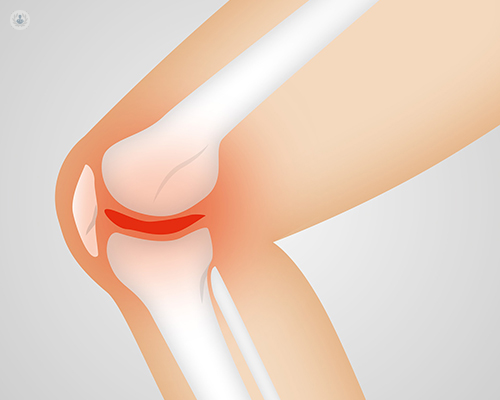Total knee replacement: what to expect
Escrito por:A total knee replacement is a procedure commonly done to relieve arthritis knee pain. In his latest article, renowned consultant orthopaedic surgeon Mr Nicholas Beattie explains everything you need to know about the procedure, including how it is done and its risks.

What is a total knee replacement?
A total knee replacement is a surface replacement of the tibia and the femur. This removes the arthritic tissue causing the pain in your knee. It allows the knee to return to a full range of motion and to be pain-free when walking. Ideally, your kneecap will be preserved, but in cases of severe kneecap arthritis, we may elect to replace the kneecap in addition to the tibia.
How is a knee replacement performed? What are the different surgical approaches?
This procedure is performed in the operating theatre. You will come to the hospital on the morning of your surgery and after a spinal anaesthetic, an incision of about 15cm will be made on the front of your knee. This allows for the exposure of the knee joint to the side of your kneecap.

A plan will be made and then the cuts are made according to the plan. Trial implants will be inserted, and then any soft tissue release will be performed before the definitive knee implants are cemented in.
We will check that you have a full range of motion before you leave the operating theatre. If the leg was curving inwards or outwards in any way then it will be restored to being straight. The knee will then be closed up and you will return to the ward to begin the rehabilitation process.
What are the risks and possible complications involved?
For most people, knee replacement surgery will return you to a completely normal life. About 80% of people will not notice that they have had the operation performed. About 20% of people will experience ongoing pain or discomfort, but usually much less than before the procedure. A small percentage of this 20% will run into serious complications, such as blood clots or problems with the nerves or blood vessels.
However, the vast majority of knee replacement patients are highly satisfied and pain-free. I do not recommend knee replacement surgery unless I believe that conservative measures have been exhausted and that the benefits of surgery far outweigh the risks.
Can both knees be replaced at the same time?
I treat all patients in a bespoke manner, with personalised care for everyone. In general, I caution against doing both knees at the same time, apart from patients who are very young and fit and well.
There may be personal circumstances, for example, if you run your own business and need the minimum possible amount of time off work, in which case we can consider bilateral knee replacements.

There is a small chance this can increase the risk of complications, and in general, if you suffer from arthritis in both knees, it is best to leave a 12-week gap between the first and second knee replacement.
When are patients able to return to full activity?
You will leave the hospital after a 2 – 3 night stay, using two walking sticks. You will be on painkillers to take the edge off, but you will need to work hard in physiotherapy, both in land-based physio and hydrotherapy.
By 6 weeks, I would expect that there will be a range of motion from 0-100 degrees, but there will still be some ongoing pain. By 3 months, your knee should have a pretty good function, and patients can start to get back to sporting activities such as tennis and golf. It is important to remember that the pain and function will continue to improve from 18 months to 2 years following the surgery.
Mr Nicholas Beattie is a leading consultant orthopaedic surgeon and an expert in complex hip and knee surgery based in Great Missenden. If you would like to book a consultation with Mr Beattie, you can do so today via his Top Doctors profile.


